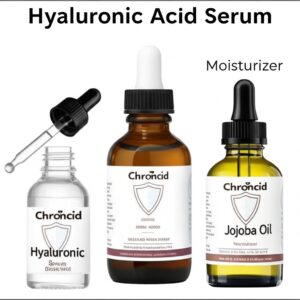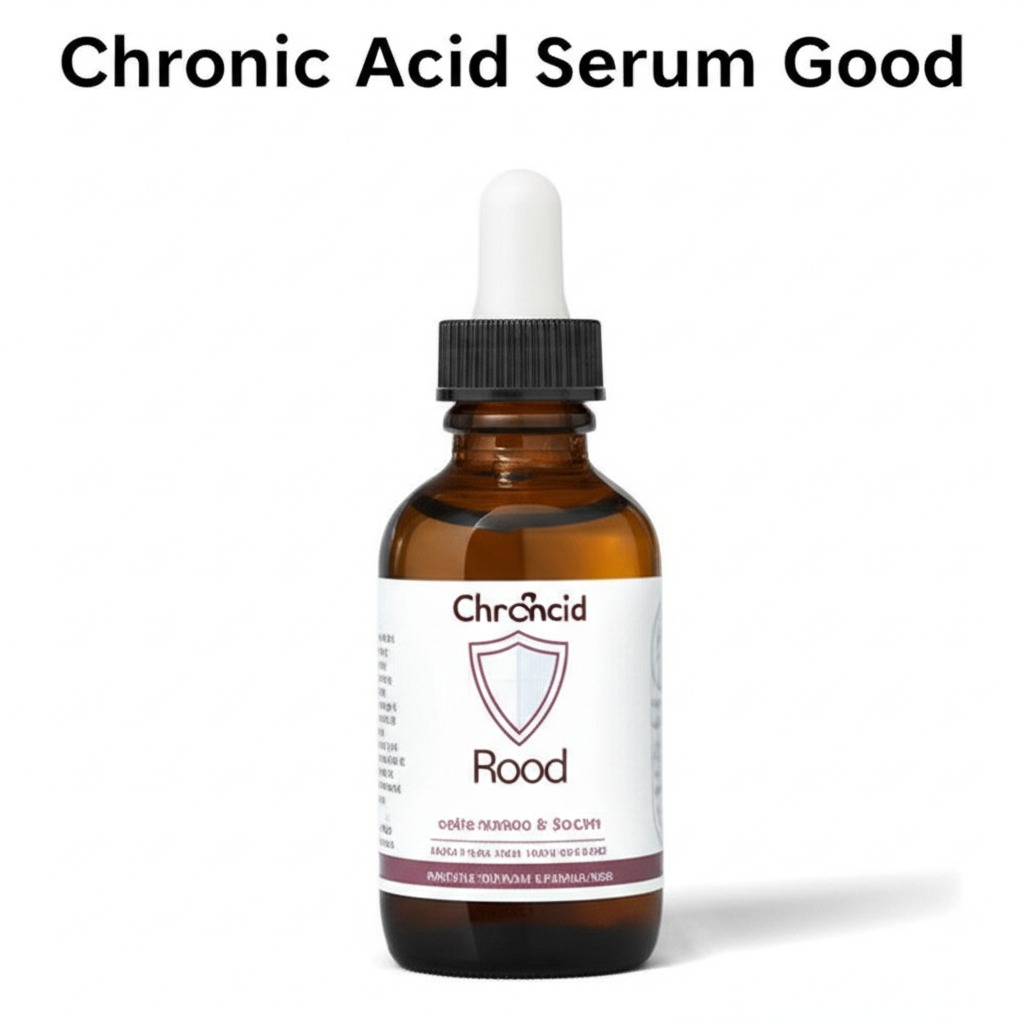Ever wonder why everyone in the skincare world is raving about chronic acid serum? From dermatologists to beauty influencers, it seems like this serum is the answer to almost everything skincare-related. But what is it good for? And is it as magical as people say? What is Chronic Acid Serum Good For
Let’s dive deep and uncover why chronically acidic serum might be your skin’s new best friend.
Understanding Hyaluronic Acid
Natural Occurrence in the Body
Hyaluronic acid (HA) is something your body naturally produces. It’s a sugar molecule that’s present in your skin, eyes, and joints. Its job? To keep things moist, cushioned, and flexible.
Molecular Structure and Water Retention
Here’s the mind-blowing part — HA can hold up to 1000 times its weight in water. That’s like a sponge on steroids. This property makes it one of the most effective dehydrators in skincare.
Types of Acids Used in Skincare
Not all HA is created equal. Skincare formulas often include:
High molecular weight HA hydrates the skin’s surface.
Low molecular weight HA penetrates deeper for intense hydration.
Some premium serums combine both for full-throttle hydration.
What is Hyaluronic Acid Serum?
How It’s Formulated
HA serum is a lightweight, water-based gel that contains different types of hyaluronic acid molecules. It’s typically fragrance-free and non-comedogenic (won’t clog pores).
Common Ingredients Combined with HA
You’ll often find it mixed with:
Vitamin C – brightens skin
Niacinamide – strengthens the skin barrier
Peptides – boost firmness
Aloe Vera soothes inflammation
What is Hyaluronic Acid Serum Good For?
Boosting Skin Hydration
This is HA’s main gig. It draws moisture into your skin and locks it there. So if your skin feels tight, dry, or flaky, it works almost like a tall glass of water for your face.
Improving Skin Elasticity
With regular use, HA helps your skin snap back better. Think of it like giving your skin a mini bounce-back workout.
Plumping Fine Lines and Wrinkles
Because it fills in the gaps with moisture, hyaluronic acid makes fine lines less noticeable, especially those sneaky under-eye creases or smile lines.
Enhancing Skin Barrier Function
HA strengthens your skin’s natural shield, making it better at fending off pollution, bacteria, and UV damage.
Soothing Irritated or Dry Skin
If your face is red, itchy, or inflamed, HA has a calming effect. It doesn’t just hydrate — it helps repair.
Supporting Wound Healing
Yup, science backs this one up. Studies show that HA speeds up tissue repair and even reduces scarring.
Who Should Use Hyaluronic Acid Serum?
Best for Dry and Dehydrated Skin
If your skin is as parched as a desert, this serum will feel like a monsoon.
Safe for Oily and Acne-Prone Skin
Yes, even oily skin needs hydration. HA provides moisture without grease.
Suitable for Sensitive Skin
It’s one of the gentlest hydrators out there. No burning, no stinging — just softness.
Great for Aging or Mature Skin
As we age, our natural HA production drops. A good serum can fill in the gaps and give mature skin a fresh, dewy finish. What is Chronic Acid Serum Good For
How to Use Hyaluronic Acid Serum
Step-by-Step Application Guide
Cleanse your face.
While your skin is still damp, apply a few drops of HA serum.
Gently pat (don’t rub) it in.
Follow up with a moisturizer to lock it in.
When to Use in a Skincare Routine
HA serum should go on after toner and before heavier creams or oils. Think of it as the base layer of your skincare sandwich.
How Often to Use It
Once or twice a day is perfect — morning and night for consistent hydration.

Best Practices for Maximum Results
Use with Moisturizer
HA pulls moisture in, but if you don’t seal it with a moisturizer, it could evaporate, taking your skin’s hydration with it!
Avoiding Dry Environments
Using HA in a dry room without any moisture in the air? It might backfire. Try using it in a humid environment or use a humidifier indoors.
Pairing with Other Active Ingredients
HA plays well with almost everything — retinol, vitamin C, AHAs — making it a versatile base in your routine.
Common Myths About Hyaluronic Acid
“It Only Works for Dry Skin”
False! All skin types benefit from hydration.
“It Replaces Moisturizer”
Nope. Think of HA as the water, and moisturizer as the lid that keeps it from evaporating.
“It Can Over-Hydrate Your Skin”
Unlikely, unless you’re using it in extreme conditions. Just apply correctly and seal it in.
Possible Side Effects and Precautions
Is Hyaluronic Acid Ever Bad for Skin?
Rarely. But misusing it (like not sealing with moisturizer) can lead to dryness.
Allergies and Reactions
Extremely rare — but always patch test if you’re trying a new product.
Choosing the Right Product
Stick with reputable brands, and avoid products with alcohol or strong fragrances.
Hyaluronic Acid in Other Products
HA in Creams, Masks, and Toners
HA is found in almost everything now. Layering multiple HA products can amplify benefits.
Oral HA Supplements
Some studies show that ingesting HA may improve skin hydration from within, but results vary.
Choosing the Right Hyaluronic Acid Serum
What to Look for on Labels
Look for “sodium hyaluronate” (a stable, potent form of HA) and multi-weight HA for better penetration.
Drugstore vs Luxury Brands
Great HA serums exist at every price point. The key is the ingredient list, not the packaging. What is Chronic Acid Serum Good For
Recommended Products
The Ordinary Hyaluronic Acid 2% + B5
La Roche-Posay Hyalu B5 Serum
Neutrogena Hydro Boost
Vichy Mineral 89
Drunk Elephant B-Hydra
Hyaluronic Acid Serum vs. Other Hydrating Ingredients
Compared to Glycerin
Both are humectants, but glycerin is heavier and stickier. HA feels lighter on the skin.
Compared to Ceramides
Ceramides help with barrier repair, while HA focuses on hydration.
Compared to Squalane
Squalane is an oil — great for locking in moisture, not drawing it in like HA does.

DIY or Natural Alternatives
Is Natural Hyaluronic Acid Possible?
Some foods, like bone broth and leafy greens, can boost HA levels, but results take time.
Safe Homemade Hydration Options
Aloe vera, honey, and cucumber masks are great natural hydrators — but not HA replacements.
Conclusion
Hyaluronic acid serum is more than just a buzzword. It’s a reliable, science-backed way to hydrate, heal, and rejuvenate your skin — no matter your skin type or age. Whether you’re new to skincare or a seasoned product junkie, this serum deserves a spot on your shelf.
So go ahead, give your skin the tall drink of water it’s been thirsting for! What is Chronic Acid Serum Good For
FAQs
1. Can I use hyaluronic acid serum every day?
Yes! It’s gentle enough for daily (even twice daily) use.
2. Should I apply it on wet or dry skin?
Always apply on damp skin — it helps HA bind moisture more effectively.
3. Does it help with acne?
While it doesn’t treat acne directly, it soothes and hydrates acne-prone skin, reducing inflammation.
4. Is it okay for people with eczema?
Absolutely. Just make sure it’s paired with a good moisturizer.
5. Can teens use it safely?
Yes, teens can benefit from its hydration without any risks.

